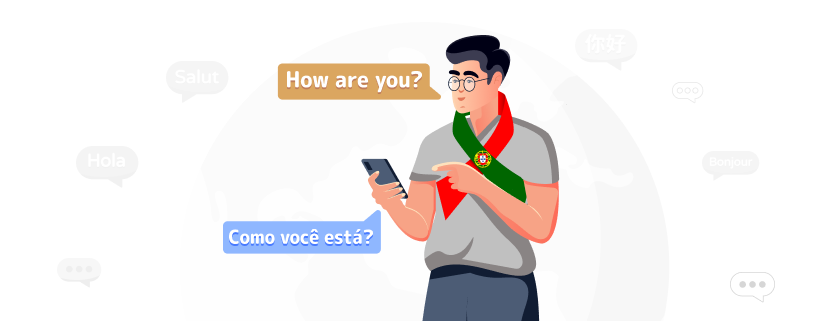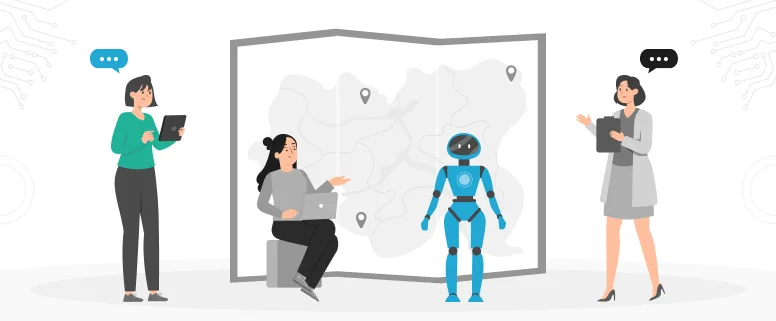When vacationing in Brazil or planning to visit new towns in beautiful Portugal, asking “How are you in Portuguese?“ may be a mystery for you. However, greetings such as “How are you?”, “hello” and “How do you do?” in Portuguese are easier than you think.
The Portuguese language, originating from the Romance language, is one of the official languages of the European Union and the fifth most spoken language in the world.
Apart from having 273 million speakers, the Portuguese language is also the third most spoken language in the Western Hemisphere.
Perhaps the huge number of Portuguese speakers has added to the popularity of this Romance language. This may be why so many people want to learn how to say “How are you?” in Portuguese.
Here are all the ways you can make a greeting in the Portuguese language:
Table of Content
- How to Greet in the Portuguese Language?
- Formal Portuguese Greetings and Translations
- Informal Portuguese Greetings
- How are You? How are you doing?–Como voce esta?/ Como vai voce?
- How are You? How are you Doing?–Como estas?, Como vais?
- Regional Variations in Greetings of Portuguese Language
- Some Basic Portuguese Greetings Everybody Should Know
- The Last Word
How to Greet in the Portuguese Language?
The native speakers of the English language might think that the Portuguese language is difficult to learn and understand. However, this language is easier to comprehend and speak as well.
There is no doubt that there are distinct differences between Brazilian Portuguese and European Portuguese in terms of grammar, vocabulary, pronunciation, and syntax. However, both of these languages are mutually intelligible. Those who speak Brazilian or European Portuguese can easily understand each other.
Moreover, their greetings and dialects are almost the same. For instance, olá is a common greeting that both Brazilian and European Portuguese speakers use to say ‘hello’. Although this way is slightly more formal, its pronunciation remains the same across all Portuguese-speaking countries in the world.
Formal Portuguese Greetings and Translations
The choice between formal and informal greetings may seem tricky to many people. But one thing that can make this choice easier is observing the person you are addressing.
If you are talking to senior citizens, a boss, a shop assistant, or a coworker, you should opt for the formula greetings listed below:
1. “How are you?”—Como Vai?
The most formal way to say “how are you?” in Portuguese is “Como vai?”. This phrase is most commonly used when introducing someone in a formal work setting. Como vai?, is the closest idiom to the English phrase “how do you do?”. It’s also a common expression across all Portuguese-speaking nations.
2. “Have you been well?”–Tem passado bem?
The informal greeting of “Everything well?” may sound inappropriate in some settings. In these cases, you can opt for a more formal version of the greetings which literally translates to “Have you been well?”
This greeting is perfect for formal situations.
3. Greetings–Cumprimentos
Just like English speakers start or finish a formal letter or an email with a greeting and “regards”, the word Cumprimentos is a distant way of addressing someone, especially if you have not met them before.
This greeting is suitable for addressing a potential employer or talking to someone in a formal setting. Some experts consider this as a very neutral option. If you’re writing to someone close, you can’t use it. If you’re in a situation that requires less formality, you can go with it.
4. Dear Mr/Mrs—Estimado/Estimada
If you are writing a formal letter to someone but think that compliments (Greetings) are way too formal, you can address the other person in a different way.
This greeting includes the name of the person you are addressing but in a slightly formal manner. The polite salutation for greeting someone by his/her name is Estimado, or Estimada—meaning Dear Mr. or Mrs. (followed by name), respectively.
5. Sincerely, Best Regards (Atenciosamente/Cordialmente)
These two greetings are the friendliest ones that you could use to finish a formal written message, a text message, or an email.
The atenciosamente/cordialmente greetings (literally translated to “sincerely/best regards) do not need to be adapted to number or gender. This is why they are practical and universal throughout the Portuguese-speaking world and regions.
However, if you are using these greetings orally, there is a slight variation between European Portuguese and Brazilian Portuguese.
You would use atenciosamente and cordialmente in European Portuguese, and atenciosamentesh and cordialmentesh in Brazilian Portuguese.
Informal Portuguese Greetings
Contrary to formal greetings, informal greetings are more often used by people of both Portuguese and other languages. If you are referring to or addressing a friend, colleague, or family member, these are the greetings you would be using:
1. Hi–Oi!
First used in Brazil, the informal greeting of saying hi has reached Portugal as well as other countries. Although Ola is more common, it is also used as a greeting on many occasions.
Oi is used in both writing and orally, especially when greeting friends or when texting on social media platforms.
2. Hello?–Alo? Esta?
The Portuguese word for hello is Alo, as you might have guessed. The word, probably derived from other languages, is commonly used as a greeting when answering the phone.
Alternatively, one can also use esta (are you..?), which is a formal greeting but is often used with everybody, or estou sim ( I am, yes?). These greetings are mostly used in response to alo when answering a phone call.
3. What’s up?–E ai?
It’s a typical Brazilian greeting. Natives in Portugal don’t use E ai? very often. However, if you use it anywhere else, people will most probably understand you.
The phrase is used both as a substitute for “hi” and “how are you?”, thus functioning as a two-in-one expression. This is why it is so useful to use in an informal setting.
On the other hand, many people in Portugal use the expression Como e que e? (How is it?), with a smile as a way to ask “What have you been up to?”
How are You? How are you doing?–Como voce esta?/ Como vai voce?
There is a difference between the usage of the word voce in Brazil and Portugal. In Brazil, voce is used in informal situations such as referring to “you” (second person), while in Portugal, this word is almost never used, either in a formal or an informal setting. Although it is very rarely used in an extremely formal situation, most Portugal-residing individuals never use it at all.
The greetings of Como voce esta? (How are you?) and como vai voce? (How are you doing?) are informal, and examples of Brazilian greetings. That is the reason you can use these two phrases everywhere with friends, family, close gatherings, and co-workers.
How are You? How are you Doing?–Como estas?, Como vais?
While Como voce esta and Como vai voce are informal greetings mostly common in Brazil, there is a slightly different way of saying “How are you?” in Portugal.
The Portuguese language often omits the person due to its implication in the conjugated verb. The phrases Como estas? and Como vais? are used in more simplified versions in Portugal.
1. Dear..,–Querido
The translation for “dear”, uttered in Portuguese as Querido, is similar to the Spanish carino or carina. People all over Portugal and in Portuguese-speaking countries use the terms querido and querida as forms of endearment. It translates to “dear” for males and females, respectively.
While querido is used as it is pronounced, the term is often introduced as a greeting during writing. A person can begin an informal letter to a pen-friend, a family member, or a colleague with a querido, followed by the name. For example, Querido John.
Regional Variations in Greetings of Portuguese Language
The Portuguese language is the official language of seven countries: Brazil, Portugal, Cape Verde, Guinea-Bissau, Mozambique, Angola, Principe, and Sao Tome.
Moreover, it is also a second language in different parts of the world, such as Equatorial Guinea, China, Macau, and East Timor.
Predictably, a greater number of regions have more variations in pronunciation. The basic pronunciation differences between European Portuguese and Brazilian Portuguese are as follows:
- The most prominent difference between Brazilian Portuguese and European Portuguese is related to consonants at the end of the words. For example, the combinations of the letters –te or -de often sound like a -gee or -tsh in Brazil, and in Portugal, its pronunciation is similar to -d or -t.
- The Portuguese pronunciation in African countries such as Angola and Cape Verde often aligns closely with European Portuguese, although some variations do exist. In these countries, the vowels have a clearer and more understandable accent as compared to the accents used in Portugal.
Some Basic Portuguese Greetings Everybody Should Know
Once a person has an idea about the basic greetings in the Portuguese language, he/she should also be adept at mastering other basic greetings such as “yes”, “thank you”, and “no” in Portuguese.
Here are all the basic Portuguese greetings that any enthusiast, traveler, or student should have an idea of. Learning these phrases and words will not only help them to travel to Portuguese-speaking countries, but it will also allow them to strike up a conversation with a Portuguese native without any worry:
- Hello–Ola
- How are you?–Como esta?
- Very good. Thank you–Bem, obrigado. E voce?
- Everything is fine– Esta tudo bom
- What is your name?–Qual e o seu nome?
- Nice to meet you–Muito Prazer
- Where are you from?–De onde voce e?
- please–Por favor
- Thank you–Obrigada (for men), Obrigado (for women)
- You are welcome– de nada
- I am sorry–Descuple
- Excuse me–com licenca
- Yes–sim
- no–Nao
- No problem–nao ha problema
The Last Word
The Portuguese language is one of the most spoken and widely understood languages in the world. The huge population of Portuguese speakers has garnered immense popularity in the language, which is increasing with the increase in tourism and education.
Being such a widely popular language, it comes as no surprise that people want to learn and converse in Portuguese.
The greeting “How are you” in Portuguese is a phrase that cannot be avoided, either in a formal or informal setting. This is why it is so important to learn how to greet in the Portuguese language if you want to travel and converse in Portugal without any worry.



